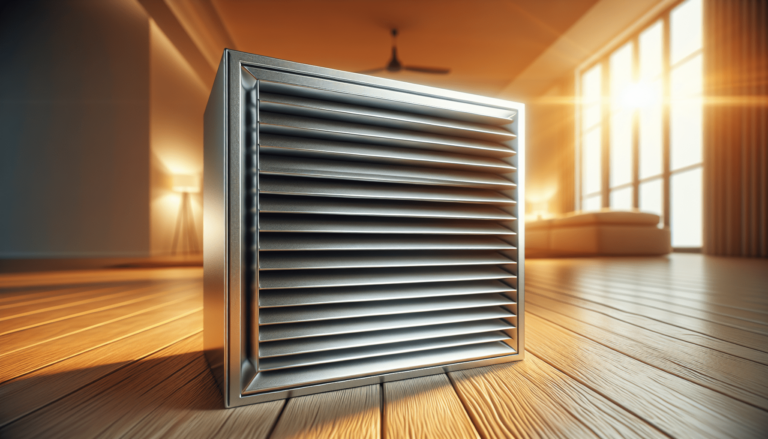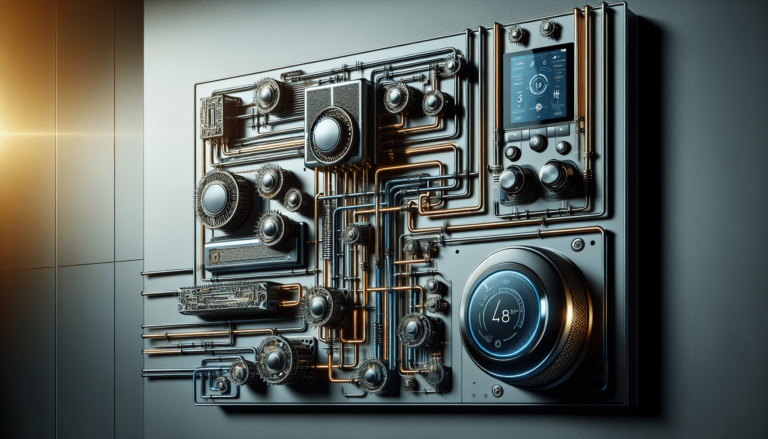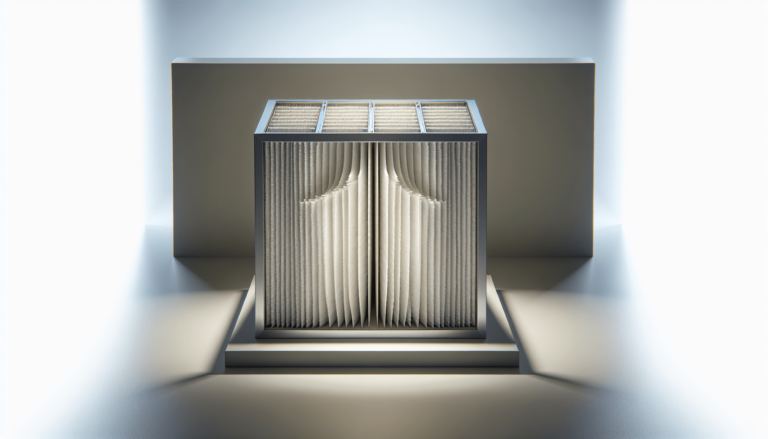

HVAC Services
Get Professional Repairs From The Area's Trusted HVAC Technicians. Ask About Our Services! We Offer Professional Heating & Cooling System Repairs And Guarantee Long-Lasting Results.
Got Question? Call us: (850) 678-2665Financing
Troubleshooting Common HVAC Problems
Troubleshoot common HVAC problems and find practical solutions in this informative post. From air flow issues to high energy bills, we've got you covered.
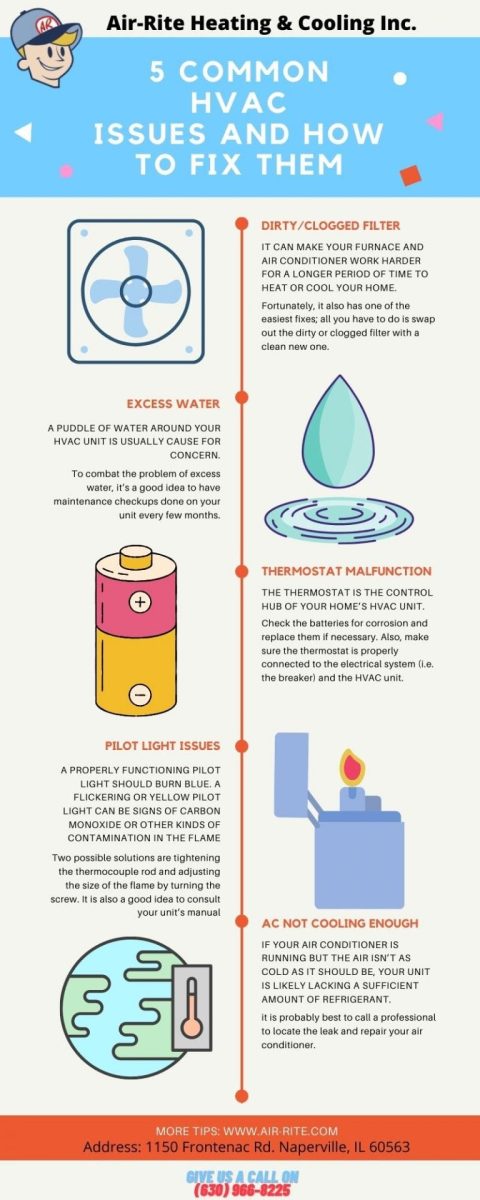
If you’ve ever experienced issues with your HVAC system, you know how frustrating it can be when your home isn’t at the optimal temperature. But fear not, because in this article, we will troubleshoot common HVAC problems and provide you with practical solutions. Whether it’s a faulty thermostat, poor air circulation, or strange noises coming from your unit, we’ve got you covered. So sit back, relax, and let’s get your HVAC system back on track for optimal comfort in your home.
Troubleshooting Common HVAC Problems
When it comes to maintaining a comfortable and healthy indoor environment, your HVAC system plays a crucial role. However, like any mechanical system, HVAC systems can encounter problems from time to time. Knowing how to identify and troubleshoot these common issues can help you keep your system running efficiently and effectively. In this article, we will discuss some of the most common HVAC problems and provide potential solutions to help you resolve them.
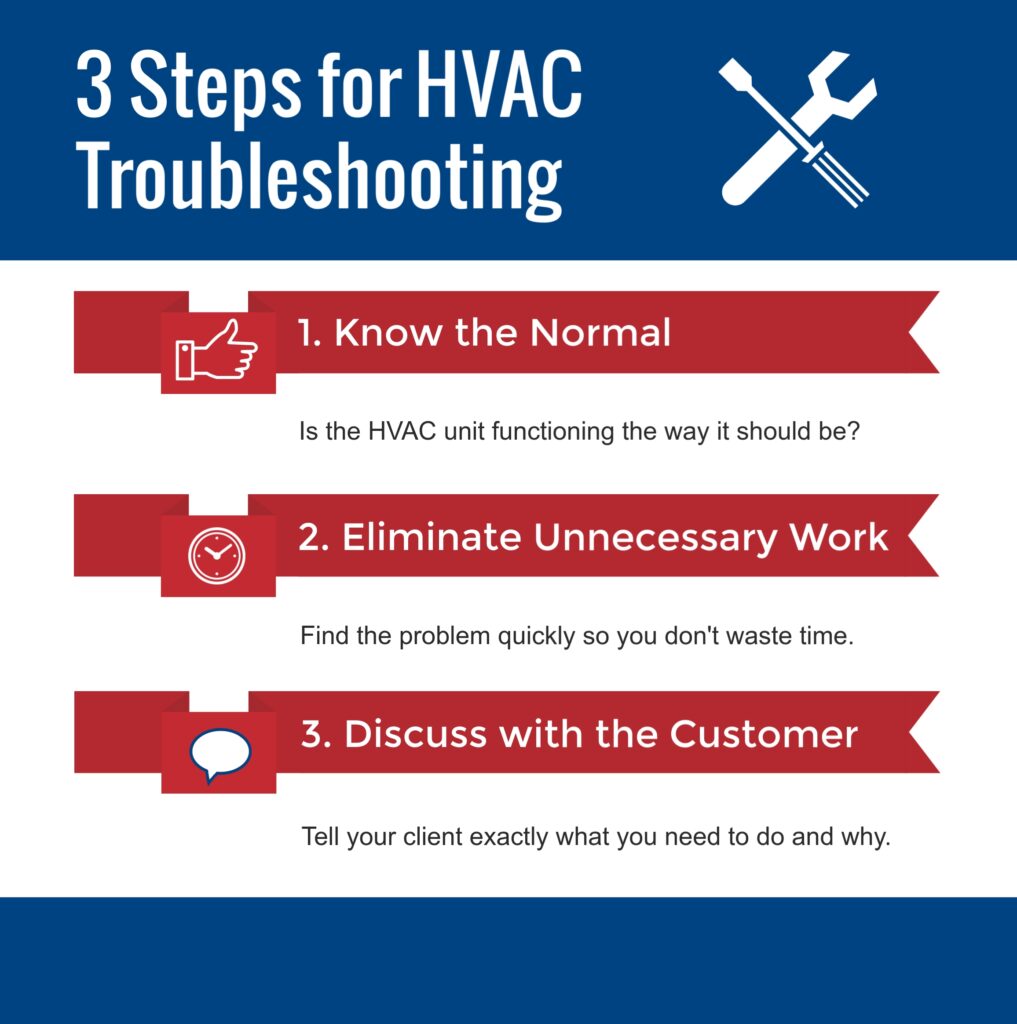
This image is property of thetrainingcenterofairconditioningandheating.com.
1. Air Flow Issues
1.1 Clogged Air Filters
One of the most common causes of air flow issues in HVAC systems is clogged air filters. Over time, dirt, dust, and debris can accumulate on the filters, restricting air flow and reducing system efficiency. To solve this problem, it is important to regularly check and clean or replace your air filters. Most experts recommend inspecting and changing filters at least once every three months, or even more frequently if you have pets or allergies.
1.2 Blocked Vents
Blocked vents can also cause air flow issues in your HVAC system. Furniture, curtains, or any other obstructions in front of vents can restrict the air from circulating properly throughout your home. Make sure to keep all vents clear and unobstructed to ensure optimal air flow. Additionally, if you have a multi-story home, make sure that all vents are open on each floor to ensure proper air distribution.
1.3 Leaky Ducts
Leaky ducts can significantly impact the efficiency of your HVAC system. In fact, up to 30% of the air that travels through ductwork can be lost due to leaks. If you suspect that your ducts are leaking, it is best to consult with a professional HVAC technician who can perform a duct inspection and repair any leaks. Sealing the ductwork properly can improve air flow and prevent energy waste.
2. Uneven Heating or Cooling
2.1 Improperly Sized HVAC System
If you notice uneven heating or cooling in different areas of your home, it could be due to an improperly sized HVAC system. A system that is too small will struggle to heat or cool your space adequately, while an oversized system may cycle on and off frequently, leading to inefficient operation. Consulting with an HVAC professional can help determine if your system size is appropriate for your home’s square footage and insulation levels.
2.2 Faulty Thermostat
A faulty thermostat can also cause uneven heating or cooling. If your thermostat is not calibrated correctly or is malfunctioning, it may not accurately read or regulate the temperature in your home. Consider replacing the thermostat if you suspect it is causing the issue. Programmable thermostats can provide precise temperature control and energy savings.
2.3 Air Duct Obstructions
Obstructions in the air ducts can disrupt the airflow, causing uneven heating or cooling. It is important to regularly check your ductwork for any blockages or debris. Clearing out any obstructions can help ensure consistent and balanced airflow throughout your home.
3. Noisy HVAC System
3.1 Loose or Damaged Parts
If you start hearing unusual noises coming from your HVAC system, such as rattling, banging, or squealing, it may indicate loose or damaged parts. Over time, components within the system can become loose or worn out, leading to noisy operation. Contact a qualified HVAC technician to inspect your system and tighten or replace any loose or damaged parts.
3.2 Dirty Fan Blades
Dirty fan blades can also cause noise issues in your HVAC system. As dust and debris accumulate on the fan blades, they can become unbalanced, resulting in a noisy operation. Regularly cleaning the fan blades can help prevent this problem and promote smoother and quieter operation.
3.3 Noisy Air Registers
In some cases, the noise may not be coming directly from the HVAC system but from the air registers. Air registers can vibrate or produce loud noises if they are loose or improperly installed. Make sure all air registers are securely fastened and properly seated in their respective openings.
4. HVAC System Not Turning On
4.1 Tripped Circuit Breaker
If your HVAC system is not turning on at all, check the circuit breaker that controls the system. A tripped circuit breaker can prevent the system from receiving power. If you find that the breaker has tripped, simply reset it. However, if the issue persists, it may be a sign of an underlying electrical problem and you should seek professional assistance.
4.2 Faulty Thermostat
A faulty thermostat can also prevent your HVAC system from turning on. Check the thermostat settings and ensure that it is properly programmed and set to the desired temperature. If the thermostat is not functioning correctly, consider replacing it with a new one.
4.3 Blown Fuse
Another common cause of a non-responsive HVAC system is a blown fuse. If you have checked the circuit breaker and thermostat, but the system still does not turn on, it is advisable to inspect the fuse box. Replace any blown fuses and see if that resolves the issue. If the fuse continues to blow, it indicates a more serious electrical problem that requires professional attention.
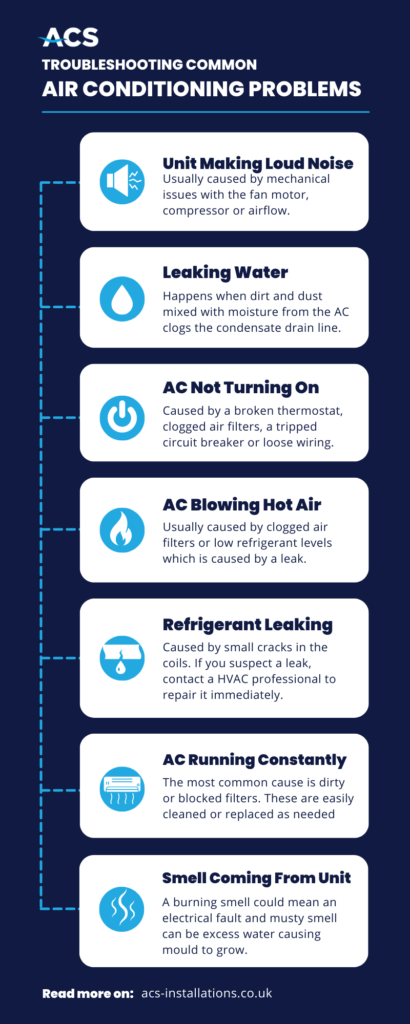
This image is property of acs-installations.co.uk.
5. Inadequate Heating or Cooling
5.1 Low Refrigerant Levels
Insufficient heating or cooling can be a result of low refrigerant levels in your HVAC system. Refrigerant is responsible for absorbing and releasing heat, and if the levels are low, it can affect the system’s ability to cool or heat effectively. A licensed HVAC technician can inspect your system, identify any refrigerant leaks, and recharge the refrigerant if necessary.
5.2 Dirty Evaporator or Condenser Coils
Dirt and debris accumulation on the evaporator or condenser coils can hinder the heat transfer process, resulting in inadequate heating or cooling. Regular maintenance, including coil cleaning, can help improve system efficiency and performance. Consider scheduling professional HVAC maintenance at least once a year to ensure optimum operation.
5.3 Malfunctioning Compressor
A malfunctioning compressor can also cause inadequate heating or cooling. The compressor is responsible for pressurizing the refrigerant and facilitating the heat exchange process. If the compressor is faulty, it may not be able to deliver the necessary heating or cooling capacity. Contact an HVAC professional to diagnose and repair the compressor issue.
6. High Energy Bills
6.1 Inefficient HVAC System
An inefficient HVAC system can significantly impact your energy bills. If your system is outdated or has a low SEER (Seasonal Energy Efficiency Ratio) rating, it may consume more energy than necessary to heat or cool your home. Consider upgrading to a newer, more energy-efficient system to reduce your energy consumption and lower your utility bills.
6.2 Poor Insulation
Poor insulation in your home can lead to energy loss and higher energy bills. Inadequate insulation allows heat to escape during the winter and enter during the summer, forcing your HVAC system to work harder to maintain a comfortable temperature. Improve your home’s insulation, especially in the attic and walls, to prevent heat transfer and increase energy efficiency.
6.3 Leaky Ducts
Leaky ducts can also contribute to high energy bills as conditioned air escapes through the leaks before reaching its intended destination. It is important to seal and insulate your ductwork properly to minimize energy losses and ensure efficient air distribution.
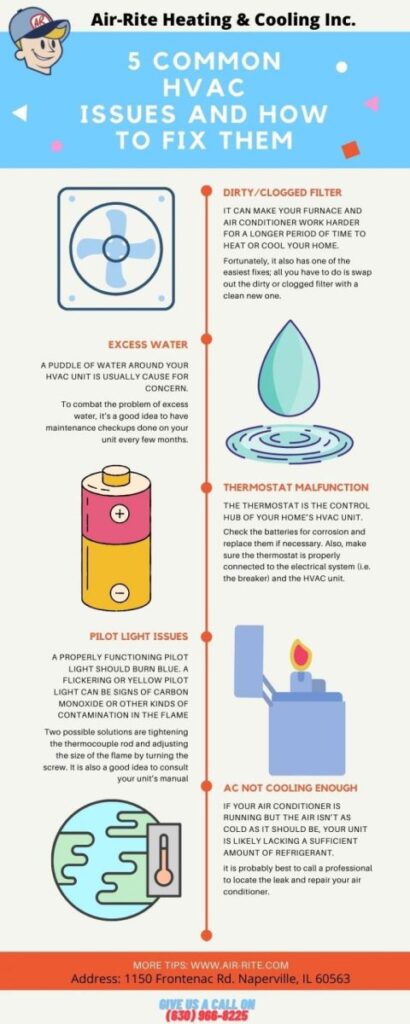
This image is property of www.air-rite.com.
7. Strange Odors
7.1 Mold or Mildew Growth
If you notice musty or unpleasant odors coming from your HVAC system, it may be a sign of mold or mildew growth. Moisture buildup in the system can provide an ideal environment for mold and mildew to thrive. A thorough cleaning and disinfection of the system, along with fixing any sources of moisture, can help eliminate the odor and prevent further mold growth.
7.2 Burnt Wires or Electrical Components
The smell of burnt wires or electrical components can indicate an electrical problem within your HVAC system. This issue should be addressed immediately, as it could pose a fire hazard. Turn off the system and contact a professional HVAC technician to inspect and repair any faulty electrical components.
7.3 Dead Animals in Ductwork
In some cases, strange odors may be caused by the presence of dead animals in the ductwork. Small rodents or birds can sometimes find their way into the ducts and become trapped, resulting in unpleasant smells. If you suspect this is the case, it is best to contact a professional HVAC technician to remove the animal safely and sanitize the affected area.
8. Poor Indoor Air Quality
8.1 Dirty Air Filters
Dirty air filters can contribute to poor indoor air quality. As the filters become clogged with dust, pollen, and other allergens, they can no longer effectively trap these particles, allowing them to circulate throughout your home. Regularly changing or cleaning your air filters can help improve indoor air quality and reduce the risk of respiratory issues.
8.2 Pollutant Sources
Poor indoor air quality can also be caused by pollutant sources within your home, such as cleaning chemicals, tobacco smoke, or pet dander. Taking steps to reduce or eliminate these sources can enhance the air quality in your home. Additionally, using air purifiers or installing indoor air quality systems can help remove pollutants and enhance ventilation.
8.3 Inadequate Ventilation
Inadequate ventilation can trap airborne pollutants inside your home, contributing to poor indoor air quality. Proper ventilation helps remove stale air, excess moisture, and indoor pollutants, replacing them with fresh outdoor air. Consider installing exhaust fans, opening windows when weather permits, or utilizing mechanical ventilation systems to improve indoor air quality.

This image is property of assets.searshomeservices.com.
9. HVAC System Cycling Frequently
9.1 Clogged Air Filters
Clogged air filters can cause your HVAC system to cycle more frequently than necessary. When the filters are dirty or obstructed, the system has to work harder to push air through, leading to more frequent cycling. Regularly cleaning or replacing your air filters can help prevent this issue and keep your system running efficiently.
9.2 Thermostat Settings
Incorrect thermostat settings can also cause frequent cycling. If your thermostat is set to excessively high or low temperatures, it can make your HVAC system turn on and off frequently as it tries to reach the desired temperature. Check your thermostat settings and adjust them to a comfortable and energy-efficient temperature range.
9.3 Short Cycling
Short cycling refers to when your HVAC system turns on and off rapidly without completing a full cooling or heating cycle. This can be caused by various factors, including an oversized system, malfunctioning components, or thermostat issues. Contact an HVAC professional to diagnose the root cause of the problem and recommend appropriate solutions.
10. Frozen HVAC System
10.1 Restricted Airflow
A restricted airflow caused by dirty filters, blocked vents, or closed registers can lead to a frozen HVAC system. When the air cannot circulate properly, the evaporator coil in the system can become excessively cold and freeze. Check for any obstructions in the air flow path and ensure that all registers and vents are open to prevent freezing.
10.2 Low Refrigerant Levels
Low refrigerant levels can also cause your HVAC system to freeze up. As the refrigerant absorbs heat, it keeps the evaporator coil from freezing. However, if the refrigerant levels are low, the coil temperature can drop below freezing, resulting in ice formation. An HVAC technician can determine the cause of the refrigerant loss and recharge the system if necessary.
10.3 Malfunctioning Blower Motor
A malfunctioning blower motor can impede proper airflow, leading to a frozen HVAC system. The blower motor is responsible for moving the air through the system, and if it is not functioning correctly, it can cause issues such as freezing. It is best to have a professional HVAC technician inspect and repair the blower motor to prevent further problems.
By familiarizing yourself with these common HVAC problems and their potential solutions, you can be better equipped to troubleshoot and address issues that may arise. However, it is important to remember that HVAC systems are complex, and some problems may require the expertise of a professional technician. Regular maintenance and professional inspections can also help prevent many of these issues, ensuring that your HVAC system operates smoothly and efficiently for years to come.
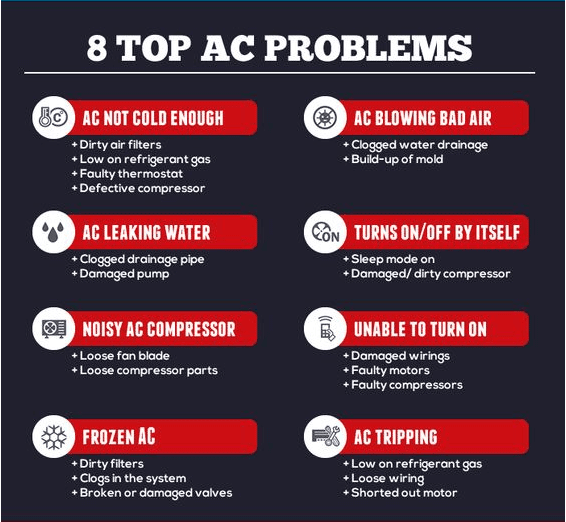
This image is property of www.searsheatingcooling.com.


